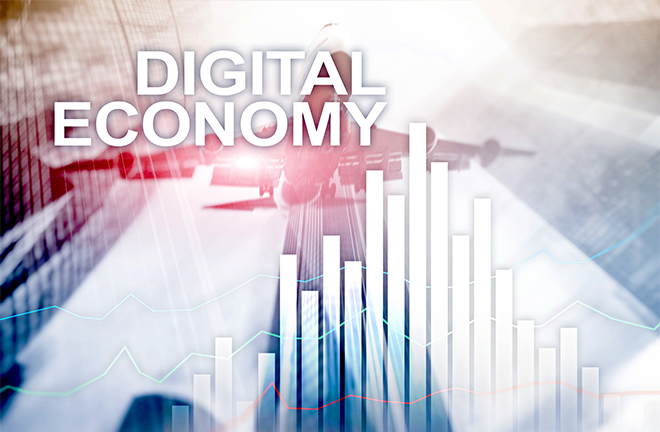Emergence and development of digital civilization

Digital civilization has emerged from the development of the digital economy. Photo: TUCHONG
In the contemporary world, modern technologies such as the internet, big data, cloud computing, and artificial intelligence are profoundly transforming human lifestyles, modes of production, and governance. The digitalization of life has brought about fundamental changes in key aspects of contemporary society to such an extent that it can be characterized as a new “civilization.”
Digital civilization has emerged from the development of the digital economy. While digital elements have always been an integral part of human civilization, they did not play an essential role in human survival and development prior to the advent of the digital economy. Today, the digital economy has become both an important engine of economic growth and a key factor influencing national economic development, global industrial distribution, resource allocation, and the international division of labor. The digital economy is more than just a virtual economy; its integration with the real economy significantly enhances a nation’s economic power and international standing.
Having progressed beyond its initial phase dominated by the rise of the internet, the digital economy is now entering a new phase defined by its transformative impact on the economy, social governance, and the service sector. It signals that the digital economy is no longer merely a supplementary tool for other fields or forms of civilization but aims to digitalize every domain capable of being digitalized. Human material civilization, political civilization, cultural-ethical civilization, social civilization, and ecological civilization will all manifest in digital form.
Firstly, unlike “human civilization,” digital civilization does not constitute an overarching concept of civilization. Rather, it pertains to a subordinate level, akin to material civilization and cultural-ethical civilization. Arising from the digital economy, digital civilization is a form of material civilization. From the perspective of civilizational history, it is similar to agricultural civilization and industrial civilization. Secondly, while digital civilization stems from the digital economy, its scope far exceeds the digital economy, encompassing the digitalization of all sub-level civilizations. Thirdly, digital civilization develops amid a thriving global digital economy, which grants it global significance.
In the context of Chinese modernization, the construction of digital civilization necessitates both an aspirational vision and a practical approach.
First, the core value and ultimate goal of building digital civilization is to benefit the people. As a new quality productive force and a technological cornerstone of the new era, digital civilization should aim to achieve common prosperity and fulfill people’s aspirations for a better life, setting a global example for other nations around the world.
Second, the construction of digital civilization must navigate the tensions among digital universality, centralization, and individual alienation. Digital technology, as a powerful and innovative force, plays an increasingly significant role in social culture and information dissemination. On one hand, digital civilization expands and enriches people’s worlds of daily life, information, and interaction. On the other hand, the omnipresence of data risks undermining individuality and human subjectivity, reducing individuals to data carriers or objects of data capture. As the value subjects of digital civilization, individuals should be fully recognized and protected in both universal and specific contexts, ensuring their dignity and privacy are safeguarded.
Third, building digital civilization necessitates optimizing the market environment, leveraging the constructive role of capital, and strengthening the guidance of socialist cultural-ethical civilization. The construction of digital civilization begins with the development of the digital economy, which in turn requires emphasizing the role of capital. Capital must be regulated through core socialist values, particularly justice and the rule of law, to ensure it better serves the digital economy.
Fourth, a digital community with a shared future for humanity should be built based on shared human values. Continuous breakthroughs in digital technology are intensifying the connections among countries in terms of social life, economic interests, and information exchange. The internet has greatly expanded the space for human production and life, with cyberspace becoming a shared, interconnected, and interdependent community for people from all countries. In this sense, the construction of digital civilization transcends national borders and holds vital significance for the future of all humanity.
Gong Qun is a professor from the School of Marxism at Shandong Normal University.
Edited by WANG YOURAN

 PRINT
PRINT CLOSE
CLOSE